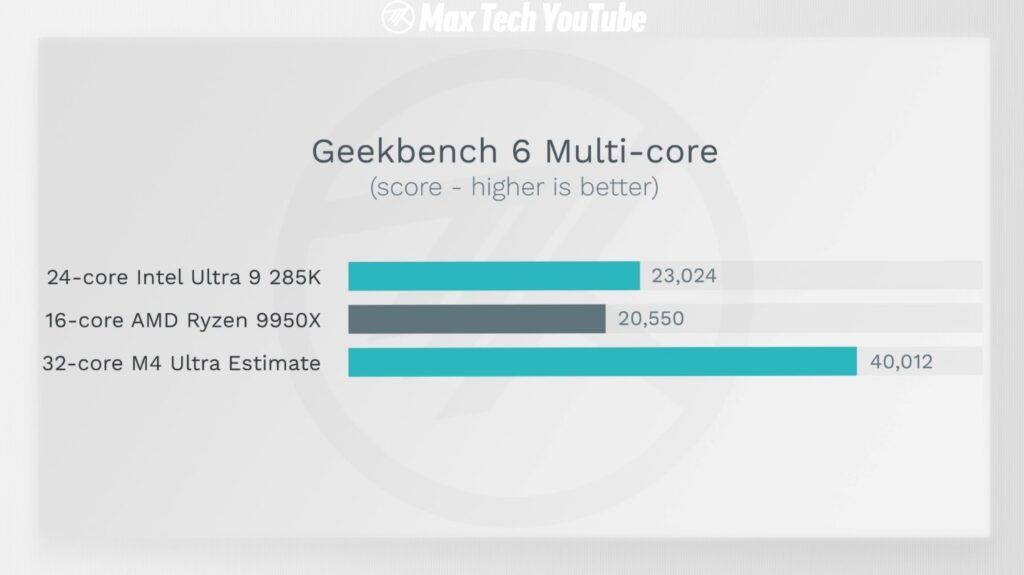
The Apple M4 Ultra, featuring a powerful 32-core CPU, is anticipated to deliver a 50% faster performance than the M4 Max’s 16-core configuration, according to Geekbench 6 multi-core results. Impressively, it’s also projected to score nearly double the performance of AMD’s Ryzen 9 9950X, making the M4 Ultra a likely game-changer in the workstation arena.
With Apple recently unveiling the initial M4 series, including the M4 Max, all eyes are now on the anticipated M4 Ultra, which is expected to debut alongside the next Mac Pro release, likely in 2024. Although there’s no confirmation about an updated Mac Studio launching simultaneously, anticipation is high as this new chip promises substantial gains over its predecessors. Initial estimates, based on the M4 Ultra’s 80-core GPU performance, suggest it could even outperform NVIDIA’s desktop-grade RTX 4090 in both OpenCL and Vulkan APIs, though these are preliminary results from a single benchmark.
Multi-Core Comparison: The M4 Ultra vs. M4 Pro and Competitors
The M4 Ultra appears set to surpass the M4 Pro by an impressive 81% in terms of performance, outstripping other high-performance processors like Intel’s 24-core Ultra 9 285K. Early estimates suggest the M4 Ultra will feature a top-tier setup with 32 CPU cores and 80 GPU cores, although specifics regarding the balance between performance and efficiency cores haven’t been disclosed.
Vadim Yuryev from the YouTube channel Max Tech shared some expected Geekbench 6 scores for the M4 Ultra, estimating an impressive 40,012 points in multi-core performance. These numbers place the M4 Ultra a full 94.7% ahead of AMD’s Ryzen 9 9950X (16-core) and 73.8% ahead of Intel’s Ultra 9 285K (24-core).
Scaling Challenges and Core Efficiency
The impressive scores were somewhat expected, given that the M4 Max had already outperformed both AMD and Intel’s processors in previous comparisons. Apple’s most advanced M4 Max setup includes a 16-core CPU (12 performance cores and four efficiency cores) paired with a 40-core GPU. However, a direct doubling of cores in the M4 Ultra doesn’t necessarily translate to twice the performance due to scalability limitations in high-core chipsets. This aspect may explain why Apple opts for restrained core specifications to manage power consumption effectively.

Performance Difference Within the M4 Lineup
For those interested in understanding the full spectrum of the M4 lineup’s capabilities, current estimates suggest the M4 Ultra will be 50% faster than the M4 Max and 81.3% faster than the M4 Pro in Geekbench 6’s multi-core benchmarks. These figures are undoubtedly impressive, but it’s essential to remember that these numbers remain estimates. Actual performance metrics could differ once the M4 Ultra is officially released next year, so these projections should be taken with caution.
Apple’s Strategic Advantage with the M4 Ultra
With the M4 Ultra, Apple solidifies its position in the high-performance workstation market, offering a chip that rivals some of the most powerful desktop CPUs available today. As Apple continues refining its ARM-based chipsets, the M4 Ultra demonstrates the company’s commitment to pushing boundaries, making it an exciting prospect for Mac Pro users and professionals who demand peak performance.








By Andrej Kovacevic
Updated on 9th March 2025